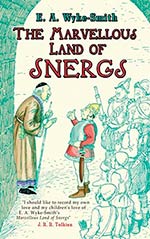
![]() gallyangel
gallyangel
4/5/2016
![]()
I state for the record that the only reason I sought this book out (interlibrary loan), is that Tolkien liked it.
I can see, I think, why a man so steeped in mythologies that he created his own, would like this book. I understand that to a man reading and interacting with his children in the 30ies and 40ies as they grew up, this book, for the times, would be interesting. But I, almost 90 years after it's first publication, don't feel the magic that they did. I am probably handicapped by not having children myself, but I'll set that argument aside.
My initial reaction to the book is that there are reasons why certain books never go out of print and others (the vast majority, actually) have their moment or two in the sun and then are seen no more. Some remain relevant, others do not. This was the usual pattern of things until the modern refinements to printing made it possible to have print runs of obscure texts in the single digits, or even simply being revived in a digital format. Nothing then, can ever truly go out of print and it's simply a matter of some format not being available while another one is.
Snergs then, is one whose time came and went, as far as I'm concerned. The only possible continued relevancy this book can have is that of a sign post. This is where children's literature was in the late 20ies when this book was conceived and written. I'm thinking that Tolkien keyed in on this roadmap aspect, which to him, might have been like hitting all the right notes when it came to a children's story. (That, of course, is pure speculation unless he specifically wrote about Snergs somewhere in his voluminous letters, notes, etc.)
The right notes for a children's story penned then are these:
Adventures as far less likely to happen in a happy home environment; there must be some degree of separation between the child(ren) and authority figures.
Adventures have to take place somewhere else, other than the child's normal world, and if that somewhere else has a pseudo-medieval setting, so much the better.
Adventures have to include getting lost, food, fine cloths,
There must be kings (or some sort of royalty). Knights are a plus. Fools or foolish characters are a definite. There must be bad guys - mean witches, ogres which eat children (a Grimm touch from those darker roots of fantasy) and animals from the natural world which scare or comfort our heroes and heroines.
A quest is always nice, even if it's as simple as getting unlost.
And everything, always, turns out right in the end.
That's the most basic formula for the roadmap to children's literature 90 years ago, as expressed by Snergs. It shows it's age and is, I would guess, just as dull to a child of the modern era as it was to me.